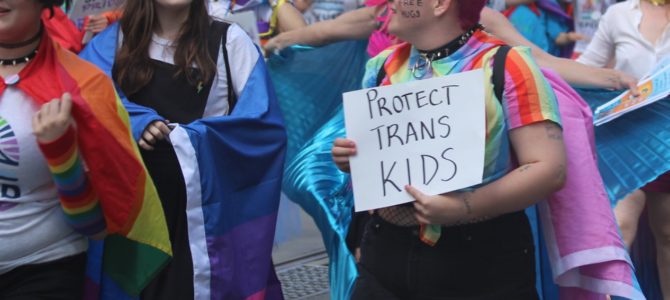
A new study, published in the January issue of the medical journal Pediatrics, titled “Pubertal Suppression for Transgender Youth and Risk of Suicidal Ideation,” is being celebrated as proof that using puberty blockers in children is positive, even “life-saving.” Citing the Centers for Disease Control and Prevention for estimates of transgender suicide risk, CNN declared, if transgender children “have access to a puberty blocker, their chances of suicide and mental health problems in the immediate term and down the road decline significantly, a new study finds.”
Dr. Michelle Forcier, a pediatrician and associate professor of pediatrics at Warren Alpert Medical School of Brown University, argued, “Nobody would deny a child with asthma their inhaler, or refuse cancer treatment for a child with cancer, yet some parents express reservations about puberty blockers.” When they do, she reminds them that these drugs can be a “life-saving option.”
“By not allowing their child to use these drugs, that is not a neutral option,” said Forcier. “This is why this paper is so important. This access is associative into adulthood and is important for safety. We know that access can offer protective effects. This is something that will help a parent keep their child safe.”
Study: Puberty Blockers Are Safe and Necessary
The study, led by Jack L. Turban, a psychiatrist at the Massachusetts General Hospital, surveyed 20,619 transgender adults aged 18 to 36 years. Of this number, 16.9 percent said they wanted access to puberty blockers as children, and of that number 2.5 percent said they had received them.
This survey was based exclusively on self-reporting. It concludes, “After adjustment for demographic variables and level of family support for gender identity, those who received treatment with pubertal suppression, when compared with those who wanted pubertal suppression but did not receive it, had lower odds of lifetime suicidal ideation.”
Essentially, the study found that the 89 adults who said they wanted access to puberty blockers as children and received them, and had strong family support, were less likely to consider suicide than those who did not. “These results align with past literature, suggesting that pubertal suppression for transgender adolescents who want this treatment is associated with favorable mental health outcomes,” the study declared. Current estimates indicate about 40 percent of transgender adults have considered or attempted suicide.
Continuing the assertion that the treatment is both safe and necessary, Dr. Joshua Safer of the Icahn School of Medicine at Mount Sinai in New York argued, “[B]ecause pubertal suppression is both safe in the medium term and reversible, it can be used with some reassurance for most gender expansive children hitting puberty in order to provide time for thoughtful consideration of next steps.” The next steps, advocates say, are transgender hormone therapy and surgery.
The concerns regarding the safety of puberty blockers in children suffering from gender dysphoria are complex, but it seems the scientific justification for their use is becoming more an exercise in affirmation than objective study. This newest study is a prime example of this bias. That experts are citing this new study immediately and without question should strongly concern both the medical community and the public.
Major Problems with the Study
Consider that the research performed on the positive connection between puberty suppression and less likelihood of suicide did not confirm the use of puberty suppression. Adults aged 18 to 36 were asked if they had wanted puberty blockers as children and then asked if they had received them. No other evidence appears to have been provided, including no examination of medical reports on the usage timeline nor the physical affects. It is entirely self-reported.
To this end, none of the subjects could have actually received the medical intervention being studied and therefore would have no way of knowing the short-term side effects nor long-term effects. Furthermore, there is no definition of what “pubertal suppression” entails nor what the survey respondents considered the phrase to mean. There is no evidence that the 89 reports used to validate the conclusion in favor of puberty blockers ever used them at all.
The report focuses on the mental health of those who self-reported using puberty blockers as children, but it fails to reconcile that 83 percent of respondents never wanted them or used them. If more than 17,000 transgender adults self-reported that they had no interest in puberty blockers in the first place and still matured into adulthood under their preferred gender identity, it would seem more reasonable to argue the lack of need for puberty blockers.
Protect Children from Puberty Blockers
Then there’s the fact that the 89 people who wanted puberty blockers and received them also indicated they had supportive families, which would have been required for them to have undergone the medical intervention in the first place. While LGBT activists often cite this family acceptance as both necessary and positive, a disturbing possibility is that the children are the product of their parents’ motivations. Puberty blockers, per the cited medical professionals, are typically started by age 8 or 9 in both girls and boys.
Despite the wide praise the study is receiving due to its politically correct conclusion, closer inspection makes painfully obvious that the researchers were not upholding rigid scientific standards, even within the subjective field of psychology. Strangely, when studies focus on the LGBT community, remarkably small numbers are published as absolute affirmation of whatever is favorable at the time. Any study wherein only 2.5 percent of respondents report experiencing the topic of the study itself should be deftly rejected by peer-reviewed journals.
Several states, including South Dakota, Missouri, and South Carolina, have proposed legislation to ban puberty blockers for minors. Despite wide acceptance from major medical authorities and organizations, it seems legislative efforts may be necessary to protect children from the reckless efforts of ideologically driven adults. If this study shows us anything, it is that those lending scientific validation to experts are just as unreliable.
This article has been corrected since publication.









